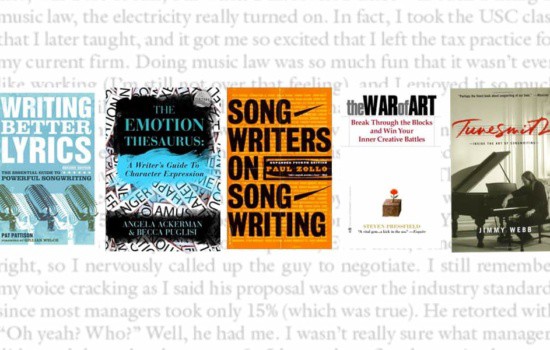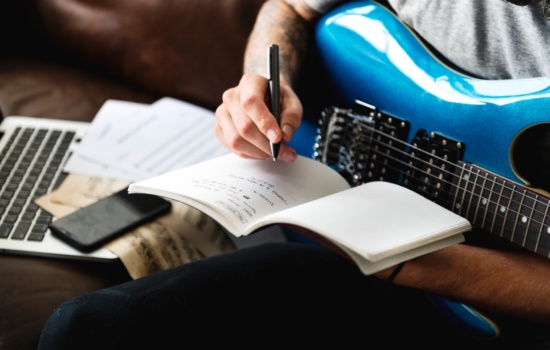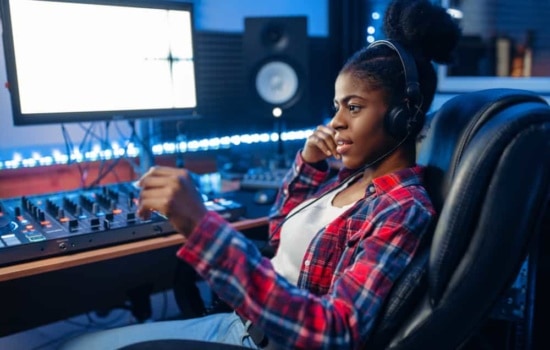Music Career Finder
Survey Start
Songwriter
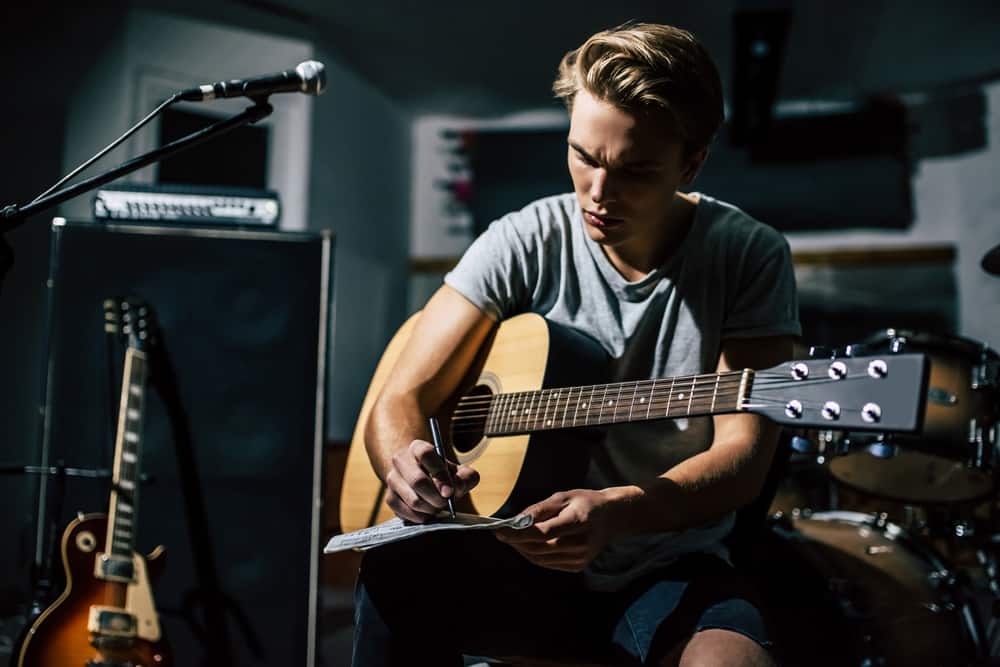
How To Become a Songwriter
- A songwriter writes songs for other artists or for themselves to record and release
- A songwriter earns royalties from the usage of those songs
- Songwriters often write in small teams, which sometimes involves the artist who will sing the song
- You don’t need a music degree to become a songwriter, but it can help you network and find opportunities
- In the beginning, you may not make much of a salary, unless you get a publishing advance, which is typically about $30,000 for a year
- Career Description
- Salary
- Career Outlook
- Career Path
- Experience & Skills
- Education & Training
- Additional Resources
- Sources
- References
Career Description
A songwriter writes songs using chords, melodies, and lyrics.
Typically, they will try to get an artist to record and release their songs, but sometimes they may also release their songs themselves.
What Does a Songwriter Do?
They write songs solo, with another songwriter (called a “co-write”), and/or as part of a team, sometimes of featuring 10 or more songwriters.
Many songwriters write songs to be recorded and released by an artist – sometimes they’re called “staff songwriters” because they write songs in partnership with a publishing company solely for artists.
Others write songs to record and release themselves or as part of a band – they’re commonly referred to as singer-songwriters.
Co-writing
Some of the most well-known modern songs (usually in pop and country) were written by a team of songwriters behind the scenes and then performed by an artist. Sometimes the artist is part of the songwriting process too.
For example, Olivia Rodrigo’s hit single “good 4 u” was written by four people: Rodrigo, Dan Nigro, Hayley Williams, and Josh Farro.
Another example is Shaboozey’s breakout country song “A Bar Song (Tipsy),” which was written by five people: Collins Chibueze (AKA Shaboozey), Nevin Sastry, Sean Cook, Jerrell Jones, and Mark Williams.
If you’re co-writing, professional songwriter Aaron Espe (songs on Grey’s Anatomy, Orange Is The New Black, ABC, CMT) said it can be “an intense few hours” and that it’s “one part therapy, one part co-writing.”
“You’re either going to somebody’s studio or living room, or they’re coming to your studio or living room,” he explained.
“And you’re presenting some ideas that you’ve been collecting, [you’ve] probably prepared a little bit for the write. And you establish what excites both of you, and there’s a chance your publisher gave you some direction on what they’re looking for. Or [you’re] writing with an artist who needs material for their next project.”
A Day In the Life of a Songwriter
A typical day for a songwriter looks different for each person, but in general, songwriters who are serious about their career treat it like going to work.
Jean Baptiste (Nicki Minaj, The Black Eyed Peas, Rihanna) says he usually writes from 1 p.m. to 7 p.m. in his home studio or at another songwriter’s place.
“I try to treat it like a job,” he said. “I know that my brain is fresh in the morning so I feel like I get my best ideas during the day.”
Espe usually works from 11 a.m. to about 5 or 6 p.m. and sometimes works 50-hour work weeks.
“If you’re doing it as a career and with a publisher, it’s more on a schedule,” Espe said.
Salary
According to Glassdoor, the average songwriter salary in the first year is $61,077 with an overall average salary of $89,212.
But this is probably skewed by the songwriters who write a hit song and earn hundreds of thousands or even millions of dollars from that hit song.
For example, Dan Wilson (writer of Semisonic’s “Closing Time”) co-wrote Adele’s “Someone Like You” and earned an estimated $882,700 from that song.
Realistically, your income as a brand new songwriter may be non-existent until you can get a publishing deal, build up a fanbase of people who stream your songs, or if you’re lucky enough to write a song that’s recorded and released by an artist that does well in streaming and/or sync licensing.
Writing a hit song is very unlikely and therefore should not be your career plan.
Most songwriters never write a hit song and end up having a more “blue-collar” songwriting career. They write many songs that each earns a moderate income, which all adds up to a livable wage.
Your income as a blue-collar songwriter may look more like Espe’s did when he got his first publishing deal: a $30,000 advance for one year. In exchange, he had to write 15 songs on his own, but he said he was usually co-writing so he ended up writing at least 30 songs a year, and probably closer to 100 songs a year.
Publishing Companies
What does a music publishing company do for songwriters?
Here are their main tasks:
- Provides a songwriter with connections (like other songwriters to write with or artists who need songs)
- Registers songwriters’ songs with a performance rights organization (PRO)
- Releases and promotes their songwriters’ songs
- Licenses the songs in their catalog (i.e. getting the songs on TV and in films)
- Monitors song usage
- Collects and distributes royalties to their songwriters
- Legal support
If you get a publishing deal like the ones Espe has had, after the publishing company recoups their advance, your publisher would split any post-recoupment profits with you (usually it’s a 50/50 split).
How Do Songwriters Make Money?
Songwriters collect royalties when songs they write are streamed, downloaded, put on TV or in a film, played on the radio, or performed live.
If you pursue a career as a songwriter writing songs for artists, here’s how you can make money:
- Publishing advance: payment from a publishing company that has to be recouped from the songs’ earnings before the songwriter can profit from royalties
- Publishing royalties: when your song is recorded and released by an artist and generates royalties
- Sync licensing: upfront payment and royalties when your songs get on TV, in commercials, in films, and in video games
- Streaming royalties: mechanical royalties generated when listeners stream your songs
- Performance royalties: generated when listeners stream your songs in public contexts and when other people or you perform your songs live
But both Espe and Dann Gallucci (Modest Mouse, Cold War Kids, Murder City Devils) say big publishing deals are becoming less common.
Income Sources as a Singer-Songwriter/Artist
Keep in mind, the salary numbers and income streams we just talked about are for those who are pursuing a career as a songwriter only, not a singer-songwriter/artist who releases their own music.
If you also release music as an artist, you give yourself more potential income streams, like:
- Touring: earn money from ticket sales and donations
- Merch sales: sell T-shirts, mugs, etc. at shows and through your artist website
- Direct fan support: financial support directly from fans (think Patreon, Kickstarter, and donations)
To Make a Living, Write a Lot
Whether or not you have a publisher, the key to making a living as a songwriter is to write a lot and never stop.
Espe estimates he’s written about 800 songs and about 10-15 of those actually generate income, which means only about 2% of his songs make him most of his money. And he said that’s normal if you’re going to be a songwriter.
It’s hard to be a DIY songwriter/artist. But if you succeed at it, you can earn more money, especially if you own your recordings.
The Two Halves of a Song
Because we’re talking about songwriter payouts, let’s briefly cover the two rights involved in the creation of a song. Knowing this will help you understand what you’re owed and if you’re getting paid fairly.
Creating a song involves two primary types of rights: the composition rights and the master rights.
Composition rights pertain to the song’s underlying musical work, which includes the melody, lyrics, and arrangement. These rights are typically held by the songwriter(s) and their music publisher if they have one.
The master rights involve the specific recording of the song, owned by the recording artist and/or their record label, covering the usage and distribution of that recorded version of the song.
This distinction allows for separate control and revenue streams for the creative and recorded aspects of a song. And it’s important you know about them, at least generally.
Hey, what do you think about trying our new Music Career HelperMusic Career Helper really quick? It’s totally free and could help get your career moving fast! Give it a try. It’s totally free and you have nothing to lose.
Career Outlook
Building a career as a songwriter is definitely doable, but writing a hit song that sets you up for decades is kind of like playing the lottery.
So before you take the songwriter career path, know that you may only be able to build a modest career — and know that that’s perfectly okay. A career doing something you love is a lucky thing to have.
Baptiste says you have to want to do songwriting, regardless of how much or little money you make.
“It’s not a career that I would put the house on,” he said. “It’s something you have to love. If I didn’t make a penny off music, I’d still be doing music. It’s in my spirit, you know? Some of us are afflicted with that thing where we’re able to receive that. It’s that gift.
Espe said you should put a lot of thought into whether you really want to try and make a living as a songwriter – relying on writing songs for other artists to make a living. His advice to aspiring career songwriters: you have to be sure you want this.
“I’d be lying if I said I wasn’t on Home Depot’s website last week and like, ‘Okay, should I take the night shift here?’” he said. “…I haven’t had a ‘real job’ since Starbucks in 2011, but who knows, you know? I don’t have a hit song that’s just a slam dunk for the next 50 years.”
And you have to have perseverance and persistence. You have to be in this for the long haul.
Judy Collins, a Grammy-winning singer-songwriter with a song in the Grammy Hall of Fame, said to “think again” about making songwriting your career.
“It’s very hard to live and play and sing and be on the road for 65 years, I can tell you that,” she said.
But, she told us, if you know this is what you want, go for it.
“…If you’re passionate about it, if you know that it makes you tick — then do it, by all means,” she said.
Despite these somewhat bleak perspectives on songwriting as a career, there are benefits to being a songwriter.
Emily Warren (The Chainsmokers, Dua Lipa, David Guetta) loves the autonomy of her career.
“…You really get to make your own schedule,” she said. “When I started off, I did double (sometimes triple) sessions 7 days a week. I did it because it was so much fun, I was learning so much, and writing was what I wanted to do 1 million percent of the time.
A songwriting career will involve hustle. There aren’t just songwriting jobs you can apply for and get. You will have to adapt to the ever-changing music industry, and you’ll need to diversify your skillset.
And despite it being difficult, Gallucci says, you can make a living as a songwriter.
“It’s not bajillions of dollars,” he said. “But it could be a steady income. Learn how to market yourself, learn how to make the connections that you need to make, put out really creative and interesting output.”
In the digital age, songwriters have more avenues than ever to get their music heard. Social media platforms like TikTok, YouTube, and SoundCloud now act as a global stage for your songs, where a catchy clip or demo can potentially reach millions (TikTok alone has over one billion active users). It’s no surprise that some industry pros have even dubbed TikTok “the discovery platform for artists today” — a viral song snippet or songwriting challenge posted online can attract a fanbase or even industry attention, bypassing traditional gatekeepers. Many up-and-coming songwriters use these channels to build an audience around their music, proving that persistence and a bit of online savvy can lead to unexpected opportunities.
Along with sharing your work, the internet makes it easier to collaborate and network as a songwriter. You can connect with fellow writers, producers, and artists through online communities, social media groups, or even virtual co-writing sessions. This means you don’t necessarily have to move to a major music city right away; by engaging with the music community online, you can start building relationships and honing your craft from wherever you are. Taking advantage of these digital opportunities can help you gain feedback, improve your skills, and get your songs in front of the right people — even before you set foot in Nashville or Los Angeles.
How Will Artificial Intelligence Affect Songwriters?
Artificial Intelligence is rapidly developing and improving, and the music industry is not immune from its effects.
You can tell ChatGPT to write your lyrics. You can use Suno to make the music for you. LANDR can master your music. And lots of recording software now uses AI to streamline the music-making process.
This is a concern for many musicians and songwriters, so I asked Espe about his thoughts on AI and the future of songwriting.
“I’m not worried,” he said. “I don’t think AI is going to replace us. If it’s between me and AI, I think I can win. But I do think another songwriter using AI could beat me.”
So it could be a good idea to play around with AI to see what it can offer you as a songwriter. How can it help you generate ideas or work faster?
“…The best analogy I’ve heard is to treat it like a dumb intern,” he said. “I imagine it being a person in the room and I ask a question and they give me an answer, but I have to triple-check it.”
As AI becomes more involved in music, listeners will most likely crave the humanness in songs. People will want the authenticity only a human can offer. So embrace AI as another tool to help you write better songs.
Career Path
There is a future in the art and business of songwriting, but it will take work.
There isn’t a single path to success, so you can pursue songwriting in the way that makes the most sense for you financially and creatively.
It’s all about learning from other songwriters and how they found success.
Some artists started out behind the scenes before they had their big break. But in reality, that big break stood on the foundation of many, many smaller breaks.
Meeting the right people. Getting attention online. Landing an important gig. These are all smaller things that can lead to bigger opportunities that, if you’re prepared for it, can lead to a big break.
How To Become a Professional Songwriter
If you’re sure you want to build a career as a songwriter, here’s how you can get started…
Step one: write a lot of songs.
There’s no shortcut for being a good songwriter. You have to just do it over and over and over again.
Ed Sheeran once said, “When you flip a dirty tap on, it’s going to flow sh*t water out for a substantial amount of time. And then clean water’s going to start flowing.”
Write with other people. Share your songs with other songwriters and people in the music industry, ask for their feedback, and then apply it to your songwriting.
Remember, Espe has written about 800 songs and only 10-15 of those make him money. Leonard Cohen didn’t write “Hallelujah” until he was 50 years old. Bob Dylan has reportedly written over 600 songs. If the greats had to write a lot of songs to succeed, so will you.
Step two: move to a music city.
These days, Nashville and Los Angeles are the main songwriting cities. It depends on what type of lifestyle you want and what genre you want to write in. Espe said L.A. is more pop-centric and Nashville is more country music, but he said it’s all becoming intertwined and not as genre-specific as it used to be.
You need to be able to network and collaborate with other songwriters. That’s how you find opportunities. You have to be there, showing songwriters, publishers, and other music industry people that you’re a hard-working songwriter.
On top of being a good songwriter, it’s about who you know.
Step three: write with other songwriters.
Espe’s advice is to just start writing with people. Get your reps in. That’s what he did after he moved to Nashville.
“I was working at Starbucks and I just started asking people to co-write,” he said. “I started writing with writers who had publishing deals and writers who didn’t.”
If you write with a songwriter who has a publishing deal, that makes the publishing company aware of you and increases your chances of getting a deal. Even if the other songwriter doesn’t yet have a publishing deal, they may get one in the future and bring up your name and a song you wrote together.
Step four (optional): find a publisher.
Big publishing deals are harder to get nowadays because they’re not as profitable for publishing companies.
“It’s very, very difficult right now for publishers to make back their investment because streaming does not pay equally to the publishing side versus the mastering side,” Espe said. “it favors the record labels.”
But if you want to find a publisher, how do you get a deal?
Espe said you have to get out and meet people. And then maybe you’ll meet someone who loves what you’re doing.
“You usually don’t sign to a company, you sign to a person,” he said. “…You sign to a champion. And you hope that they stay with the company, otherwise you’re a bit like a stepchild if they leave. Because then somebody else comes in and they don’t know your work and you’re still stuck in a contract.”
Step five: diversify your skillset.
Espe said that because it’s so hard to make it solely as a songwriter, you need to diversify your skills and income streams.
He said you should learn an instrument or do something songwriting-adjacent so you can develop “other rare and valuable skills” to help yourself stand out.
It’s a good idea to know how to record at least a demo of your songs. If you can develop your producing skills and deliver a good-sounding recording, that’s even better.
This is where you can release your own songs under an artist/stage name. It will give you a chance to practice your music marketing and business skills and techniques. And, if you do it well enough, it can provide extra sources of income.
Step six and beyond: keep going.
Perseverance is one of the most important attributes to have as a songwriter.
Getting better as a songwriter and finding the right opportunities will take time. You will get lots of no’s before you get yes’s, so you need to build up a thick skin.
If you choose songwriting as a career and truly want to succeed at it, prepare to be in it long term. Build up your songwriter portfolio and keep going.
Experience & Skills
What skills do songwriters need? Here are the things you should focus on if you want to succeed as a career songwriter…
Write Commercially Viable Songs
People in the publishing and sync licensing world are listening to music to solve a problem – to find the right song with the right mood in the right genre with the right lyrics, whether it’s for an artist to record or if it’s for a TV show, commercial, or film.
“I think there’s a difference between relatability and [commerciality],” Espe said.
“…When you’re writing to try and make a living, you’re writing for somebody else who has a boss, and you have to know who that boss is. So for me, when I’m in a publishing deal, I know my boss, so to speak, is my song plugger. My song plugger also has a boss. …There’s about 15 people between you and a paycheck.”
And in the world of career songwriting, it takes a different set of skills.
“When you’re writing songs just to create art or if you’re releasing music as an artist, you can do whatever you want,” Espe said. “But if you want to make a living as a songwriter, you’re providing a service and a product that has to fit what the ‘boss’ needs.”
Learn To Play an Instrument
You don’t have to play an instrument, but it’s highly recommended.
Jason Blume (Britney Spears, The Backstreet Boys) and Espe both specifically suggest learning an instrument because it will make your job a lot easier.
Learn To Record a Simple Demo of Your Songs
Simple recording setups are very affordable these days. If you have a laptop (which most people do), you can spend a few hundred more dollars to get a home recording setup.
Gallucci thinks songwriting and producing have a lot of overlap.
“I think a lot of people disagree with me on this, but I like songwriters who want to know a little bit about the recording process because it’s so much a part of modern songwriting,” he said.
Know the Music Business
You want to be familiar with how the business of songwriting works, how you should be getting paid, and what your rights are. Even if you hire a music lawyer, it’s smart to understand the basics of royalties, publishing, contracts, and licensing.
Perseverance and Persistence
You must keep going. The only ones who succeed are the ones who didn’t quit.
“Being a songwriter requires unending perseverance and a willingness to keep pursuing your goal no matter how long it takes,” Blume said.
“…Also, you need to be someone who can handle not having a guaranteed, steady income, and you need to be able to cope with the pressure of needing to consistently produce ‘hits.’”
Listening and Empathy
Warren makes the point that songwriting is all about listening, storytelling, and saying relatable things in new ways.
“I think if you want to write songs for other people, you have to be interested in listening and finding empathy in other people’s stories,” she said. “And I think that regardless if you’re writing for yourself or others, you have to be willing to be vulnerable. In my opinion, good songwriting comes from framing common thoughts in new ways.”
Espe said something similar, highlighting the fact that songwriting involves listening.
“…For the most part, you’re just living your life and paying attention and then writing stuff down.”
Baptiste agrees, saying songwriting is about paying attention.
“You have to be able to pay attention to what’s going on around because sometimes you can write about things that happened to you or happened to someone in a situation that’s either adjacent to you or not,” he said.
Education & Training
You don’t need formal training as a songwriter to make a living at it, although going to a music school for songwriting can provide the connections and network you will need to succeed.
Songwriter Degree vs. Hands-on Experience
Many successful songwriters and artists went to music school, including John Mayer, Maggie Rogers, Paul McCartney, and Miles Davis.
On the other hand, many successful songwriters did not go to music school, like some of the songwriters quoted on this page.
The point is, that it’s important to learn the craft of songwriting from people who have lots of experience and success doing it. You can do this through traditional music school, or through DIY means, like songwriting books, online courses, and YouTube videos.
Go with the methods that fit how you learn best. Just make sure you’re always learning. A good place to start is with your songwriting idols.
“Whatever [you’re] listening to is probably [your] best teacher for right now,” Espe said.
Do you need to be technically trained in music?
While technical training in music and music theory can help you, it’s not a requirement to succeed as a songwriter. Many successful songwriters have relied on their natural talent, creativity, practice, and persistence to get where they are.
Understanding music theory can help you write more sophisticated songs and know how to explain music to other people who know music theory.
But sometimes simplicity works better.
What’s most important is creating an emotional response in the listener as well as a song that is needed by the end client, so focus on emotional expression, storytelling, and personal experience.
Do you need to know how to sing?
While being a good singer can definitely make it easier to write creative melodies, you don’t have to be a singer to succeed as a songwriter.
Understanding melody, rhythm, and structure is more important than being able to sing well, and you can develop these skills without being a singer.
You can always collaborate with singers and other musicians to bring your songs to life, allowing you to focus on the craft of songwriting itself.
Do you need to know how to produce music?
As we discussed in the section above, you don’t have to know how to produce music.
It can help to know how to record quality versions of your demos. But you don’t have to learn all the ins and outs of producing, mixing, and mastering. If you can get a clear recording that’s on time with a click, you’ll be fine.
That being said, if you do want to develop your recording and production skills, that will really help you stand out as a songwriter.
How to improve your songwriting skills
Improving your songwriting skills is a gradual process that takes practice, study, and creativity. Here are some tips to help you continually improve your songwriting skills on your journey toward becoming a full-time songwriter:
- Listen actively, both to great songwriters’ songs and in everyday life
- Keep a songwriting journal, so you can record your thoughts, ideas, and snippets of lyric ideas
- Study the song structure of your favorite songs, even rewrite them in your own words with your own music
- Read and write regularly: read to fill the well, write to empty it
- Explore different genres, stretching yourself musically
- Collaborate with other songwriters: this is the key to writing a great song and getting a song picked up by an artist
- Attend songwriting workshops and seminars
- Stay persistent and patient because making a living as a songwriter can take months or years to accomplish
Want to go more in-depth on how to become a better songwriter? Check out this guide.
Additional Resources
Blume is a big believer in networking opportunities.
He suggests researching your local songwriting organizations. They can provide both educational and networking opportunities.
Here are a few to get you started:
- Nashville Songwriters Association International (NSAI) has chapters in more than 110 cities
- Songsalive meets in multiple cities
- West Coast Songwriters organization provides opportunities for those in that part of the country
- Find more songwriting organizations in Blume’s book This Business of Songwriting
- For other books that teach valuable business and creative skills, check out our related blog post
Learn the Different Types of Royalties
Royalties are the main way a songwriter makes money, so it’s important to understand how they work and how you can collect yours.
In the United States, four main types of organizations that collect royalties on your behalf or pay you directly for the use of your music.
1. Digital Distributor
Digital distributors are companies that deliver your music to Digital Service Providers (DSPs) like Spotify and Apple Music. When someone plays your song on a streaming platform, the platform owes you a streaming royalty. Each DSP pays streaming royalties a little bit differently and at different rates, but they all pay your distributor directly. The distributor then pays you, sometimes after taking a cut.
2. Performance Rights Organization (PRO)
A Performance Rights Organization (PRO) represents songwriters and publishers, collecting performance royalties anytime there’s a public performance of your song.
Public performances include live performances, public places streaming your music (like bars, restaurants, coffee shops), TV, and radio airplay. The major PROs in the U.S. are ASCAP and BMI, with SESAC and GMR being invite-only.
(More on what PROs do in the next section).
3. Publisher or Publishing Admin Company
A publisher or publishing admin company collects your performance royalties if you’re not registered with a PRO. They also expedite the collection of foreign performance royalties by registering your songs with PROs in other countries. On top of that, they collect mechanical royalties, which is another royalty generated when someone streams or buys your music.
In the U.S., the Mechanical Licensing Collective (MLC) is responsible for collecting and paying out all mechanical royalties. Your publisher or publishing admin company should be partnered with the MLC as well as with mechanical royalty organizations outside the U.S.
4. SoundExchange
SoundExchange handles the collection and payout of digital performance royalties for non-interactive uses of the recording (platforms that don’t let the listener choose the music, like Pandora, SiriusXM, and Beats1).
SoundExchange is the only place in the U.S. collecting and paying out sound recording performance royalties. They also handle neighboring rights royalties for sound recording performances outside the U.S.
What Does a Performance Rights Organization Do?
Performance Rights Organizations (PROs) play an extremely important role in helping songwriters get paid. They collect and pay performance royalties for a songwriter’s song.
Here are the main things a PRO does:
- Song registration: Songwriters can register their songs with their chosen PRO, which then tells the PRO what songs they should be collecting royalties for.
- Monitoring public performances: They monitor and track where and how often songs are played through different means, like digital fingerprinting and data collection from broadcasters and venues.
- Royalty collection and distribution: PROs collect performance royalties on behalf of songwriters whenever their music is played publicly, like on the radio, on TV, on streaming services, at live venues, and other public places.
What Does a Music Publisher Do for Songwriters?
A music publisher helps a lot of songwriters turn their craft into a career. They handle the aspects of a songwriting career that the songwriter is not usually well-versed in. Here are some of the main ways a music publisher helps songwriters:
- Administration: They manage the registration of songs with performance rights organizations (PROs) and handle all the necessary paperwork, helping songwriters get paid for their work.
- Licensing: They negotiate and secure licenses for the use of songs in visual media, like films, TV shows, commercials, and video games. This helps increase the exposure and revenue of the songwriter’s work.
- Royalty collection: They collect royalties from multiple sources, like performance royalties, mechanical royalties, and sync fees, on behalf of the songwriter.
- Promotion: They actively promote songwriters’ works to artists, record labels, and media producers in an attempt to get the songs recorded and released.
- Creative development: They provide feedback, set up co-writes, and connect songwriters with producers.
- Legal support: They help protect the songwriter’s intellectual property by monitoring and enforcing copyright, dealing with infringement issues, and making sure proper legal agreements are in place.
Sources
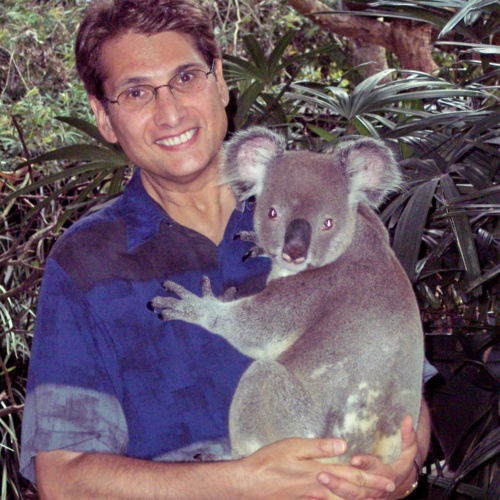
Jason Blume
Jason Blume is one of the few songwriters to have hit songs on the R&B, country, and pop charts simultaneously. His songs have been recorded by Britney Spears, the Backstreet Boys, the Gipsy Kings, Jesse McCartney, the Nashville Chamber Orchestra, and many other artists around the world. His work has appeared in movies and TV shows such as Scrubs, Friday Night Lights, Dangerous Minds and Disney’s Kim Possible. He has served as a judge for many songwriting competitions, including SongDoor.
Blume is the author of the best-sellers 6 Steps to Songwriting Success: The Comprehensive Guide to Writing, Inside Songwriting: Getting to the Heart of Creativity, and This Business of Songwriting (reviews via Goodreads). He has been featured in American Songwriter, The Music Row Show, Taxi Independent A&R Radio’s Taxi TV, McSweeney’s, The Irish News, Northamptonshire Telegraph, Belfast Live, The Ringer, and West Hawaii Today.
He also teaches the business and craft of songwriting at industry conferences, colleges, and universities around the globe, including the annual BMI conference and Nashville School of Music. Check out his bibliography via Amazon and his discography via Discogs. His work has been covered by several artists; check out Secondhand Songs to learn more.
For more advice from Blume, check out his articles for Songwriting.net and his BMI songwriting workshop. He can be found online at jasonblume.com.

Emily Warren
Singer, songwriter, and producer Emily Warren can be heard in nearly every corner of modern pop as well as dance, country, alternative, and Latin. Achieving a GRAMMY® Award, countless multiplatinum and gold certifications, millions of digital sales worldwide, and 5.4 billion streams by 2018, she stands out as the rare talent who can nimbly adapt to any genre.
Her discography encompasses eleven anthems for The Chainsmokers. Among those, “Don’t Let Me Down” (6x-platinum) won the 2017 GRAMMY® in the category of “Best Dance Recording.” Other standouts range from Dua Lipa’s “New Rules” (3x-platinum) to Becky G’s “Mad Love” and Sean Paul’s “No Lie” [feat. Dua Lipa] as well as songs for David Guetta, Bebe Rexha, LANY, Galantis, Sigrid, and Noah Cyrus. Meanwhile, her voice can be heard featuring front and center on FRENSHIP’s platinum-selling “Capsize” and the gold-certified “Until You Were Gone” by The Chainsmokers & Tritonal in addition to The Chainsmokers’ rising 2018 single “Side Effects.”
Forbes touted her among its “30 Under 30 Class of 2018” as further acclaim came from People, Billboard, Time, Entertainment Weekly, Refinery29, Nylon, and US.
Warren has also received nods from American Songwriter, Variety, (twice) Rolling Stone (twice), Teen Vogue, W Magazine, Paper, Oprah, Huffington Post UK, The Evening Standard, Pitchfork, Popsugar, The New York Times, Stereogum, Songwriter Universe, United by Pop, Just Jared, Thrive Time Show, USA Today, Forbes, Switched On Pop, Master & Dynamic, Meaww, Mic, Pop Crush, Elite Daily, And the Writer Is…with Ross Golan, CULTR, Naga Mag, TooFab, Atwood Magazine, Girlboss, Wonderland Magazine, C-Heads, Babe, Variance Magazine, Ladygunn, and The Young Folks.
She has also received coverage via ABC News, EDM.com, AM NY, Baeble Music, Ceek VR, MTV, Yahoo! Sports, iHeart Radio, and Songwriters Hall of Fame.
Warren was a performer at the 2019 ASCAP Pop Music Awards, which you can watch here. You can also see her performing live via TooFab’s YouTube channel. For more of Warren’s thoughts on songwriting and performing, check her out on LIMPI Music, Sweety High, and her Reddit AMA.
Photo Credit: David O’Donohue

Dann Gallucci
Dann Gallucci started playing in bands in High School. After that, he split time between hardcore bands and Modest Mouse. He was a member of the Murder City Devils in the late nineties (and now). When the band broke up he re-joined Modest Mouse during a period of growth for the band.
“Float On” became a pretty decent-sized hit and then he quit for some reason and went to audio engineering school. He came home from school and did monitor and front-of-house engineering for bands like Miike Snow, MIA, and the XX. Another band he worked with was Cold War Kids, who he would end up joining as a Songwriter, Guitar Player, Producer, and Engineer.
Cold War Kids had a decent-sized hit as well with “First” which, aside from helping to write and playing guitar, he had also produced and mixed. After realizing he no longer wanted to tour (by this time, he had a little munchkin named Maria), he switched gears, became a Radio Producer and started a podcast production business called Little Everywhere with his partner Jane Marie. He lives in LA with his daughter.
His work has received two Grammy nominations. Check out his discography here.
He has been featured in The LA Times, Today, The New York Times, KCRW, Variety, The Guardian, Brooklyn Vegan, NME, American Songwriter, The Boston Globe, Podchaser, Pro Sound News, the I’m Afraid That podcast, the 100 Words or Less podcast, the Tour Stories podcast, The Pitch Kansas City, Vulture, Transverse, New Scientist, The Stranger, OC Weekly, Press of Atlantic City, SF Weekly, Rochester City Newspaper, Star Tribune, Seattle Times, Diffuser, Pittsburgh City Paper, Washingtonian, Seattle Weekly, WVAU, The Annenburg Foundation, The Sydney Morning Herald, Business Insider, Daily Utah Chronicle, Lansing State Journal, Boulder Weekly, Ultimate Guitar, Detroit Metro Times, Phoenix New Times, Glide Magazine, Paste Magazine, Dallas Observer, The Aquarian, The Telegraph, The Young Folks, the Universal Audio blog, and The Hollywood Reporter.
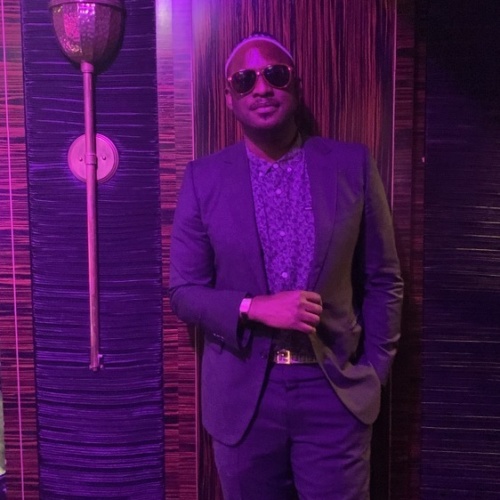
Jean-Baptiste Kouame
Jean-Baptiste Kouame, professionally known as Jean Baptiste, stands as one of the music industry’s most prolific and esteemed Producers/Songwriters. He has been the guiding and essential touch on some of pop, rap, and R&B music’s most successful and chart blazing songs and albums. His distinguished talents have earned him credits on numerous platinum-selling records with artists such as Chris Brown (Fortune, F.A.M.E., X, Graffiti, Royalty), Nicki Minaj (Pink Friday, Roman Reloaded: The Re-Up), Rihanna (Rated R), Kid Cudi (Man on The Moon), Kelis (Flesh Tone), and Madonna (MDNA).
Jean Baptiste has established himself as one of the go-to hitmakers for music’s biggest artists. Jean Baptiste collaborated with Chris Brown on F.A.M.E. to create some of his most memorable singles, including “Beautiful People,” “She Ain’t You,” and most famously “Look At Me Now,” which reached #6 on the Billboard Hot 100 and The New York Times called the track the “highlight of the album.” He also produced the hit song “Time For Love” off of Brown’s 6th album X. His work as a Producer on Kid Cudi’s debut studio album Man On The Moon led to the unforgettable tracks “Up Up & Away” and “Heart of A Lion.”
He will forever be recognized for his role in the making of three of The Black Eyed Peas’ most popular albums, Elephunk, Monkey Business, and The E.N.D., which was certified two-times Platinum in the U.S. Jean Baptiste’s production work helped create some of the most recognizable songs from the album, including “Boom Boom Pow” which spent twelve weeks at number one on the Billboard Hot 100, and the single “Meet Me Halfway,” which was the tenth best selling single of 2009 in the U.K.
The lasting collaborative relationships he has formed with the group have also carried over to their solo careers, working with Fergie on The Dutchess and will.i.am. on Songs About Girls and apl.de.ap. He also worked with will.iam. as a co-writer on the charted singles “Feelin’ Myself” and “Scream & Shout” from #willpower.
His songwriting and producing made waves with Chris Brown’s album, Royalty, Rudimental’s album, Home, DJ Mustard’s single, “Whole Lotta Lovin,” Sevyn Streeter’s gold single “It Won’t Stop”, Miley Cyrus’ “Do My Thang”, Dr. Dre’s album, Compton, and “Woo” off of Rihanna’s dynamic album, ANTI.
Jean Baptiste’s writing and producing has continued to make waves with his work on “Bring it Back,” “Made of Glass,” “Surrender,” and “Running With A Ghost” on Lil Yachty’s album, Teenage Emotions, and “Lottery” on Kid Ink’s album, 7 Series. He also co-wrote “F.U.” on Little Mix’s smash album Glory Days, which went triple platinum in the U.K.
This past year, he began a new collaboration with up and coming artist, Tommy Genesis, with a co-producing credit on the song, “It’s OK” featured on her debut, self-titled album, while still maintaining old partnerships, as he co-wrote “Ring the Alarm pt.1 pt.2 pt.3” on the Black Eyed Peas’ seventh studio album, Masters of the Sun Vol. 1.
His career has received notice via NME (twice), Los Angeles Times, Rolling Stone, The Hollywood Reporter, The New York Times, The Quietus, Digital Spy, Madonnarama, Press Party, Pop Crush, and Metro UK.
Partial discography available via Discogs.
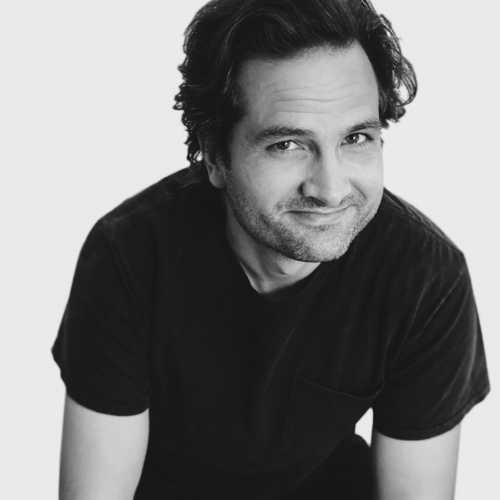
Aaron Espe
Aaron Espe is a Nashville-based songwriter/artist whose songs have been on ABC and CMT, in shows Grey’s Anatomy and Orange Is The New Black, and his song “Anytime I Go” was featured in a Stella Artois campaign. He’s worked with Brian F. Joseph, who has produced Bon Iver and Sufjan Stevens. Taylor Swift caught wind of his song “Making All Things New” and added it to her playlist “Songs Taylor Loves.” Through Nettwerk Records, he released the EP Through Frozen Forests, which peaked at #7 on the iTunes Singer/Songwriter chart.
He’s also the author of On Songwriting: Practical Tips and Insights from a Decade in Music City, which has garnered praise from Leigh Nash (frontwoman of Sixpence None The Richer), Philip Philips (certified Platinum recording songwriter/artist and 2012 American Idol winner), Barry Dean (Grammy-nominated hit songwriter for Little Big Town, Tenille Townes, Ingrid Michaelson), Isaac Slade (co-founder of Grammy-nominated band, The Fray) Ben West (songwriter and producer for P!nk, Tim McGraw, Lady Antebellum), and Bonnie Baker (songwriter for Reba McEntire, Hunter Hayes, Rachel Platten).

Judy Collins
Judy Collins is an award-winning singer-songwriter whose career dates back to the 1960s. Renowned for her unique interpretations of both traditional and contemporary folk classics, as well as her own deeply moving original works, she has earned widespread admiration.
Her iconic version of Joni Mitchell’s “Both Sides Now” from her groundbreaking 1967 album Wildflowers was inducted into the Grammy Hall of Fame. Judy’s hauntingly beautiful and intimate take on Stephen Sondheim’s “Send in the Clowns,” from the Broadway musical A Little Night Music, earned her the “Song of the Year” award at the 1975 Grammy Awards. She has enjoyed numerous top-ten hits and has released several gold- and platinum-selling albums.
More recently, artists like Rufus Wainwright, Shawn Colvin, Dolly Parton, Joan Baez, and Leonard Cohen have paid tribute to her legacy on the album Born to the Breed: A Tribute to Judy Collins.
Judy Collins remains as creatively active as ever, continuing to write, tour worldwide, and support emerging talent. A true Renaissance woman, she also serves as a filmmaker, record label executive, musical mentor, and a sought-after keynote speaker on topics like mental health and suicide prevention. Through her music, she continues to offer hope and healing, touching hearts and lighting the way for others.
References
- 1. "Songwriter Salaries". Glassdoor. published: Jun 6, 2024. retrieved on: August 9, 2024
- 2. "How 10 Major Songwriters Make Big Money". Rolling Stone. published: 19 January 2012. retrieved on: August 9, 2024
- 3. "Singer-songwriter Leonard Cohen's entire song catalogue sold to Brit firm that acquired Neil Young's tunes". The Economic Times. published: Mar 7, 2022. retrieved on: Aug 9, 2024
- 4. "Bob Dylan Sells His Songwriting Catalog in Blockbuster Deal". The New York Times. published: Dec 9, 2020. retrieved on: Aug 9, 2024

